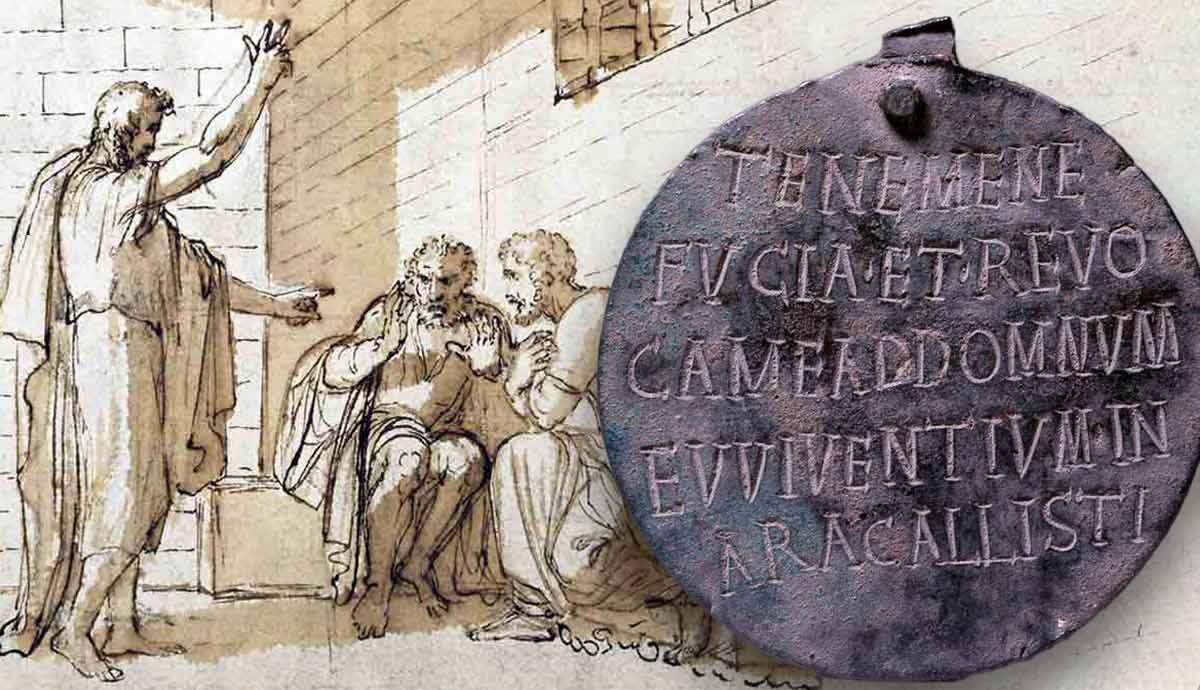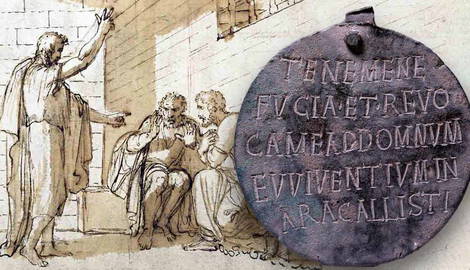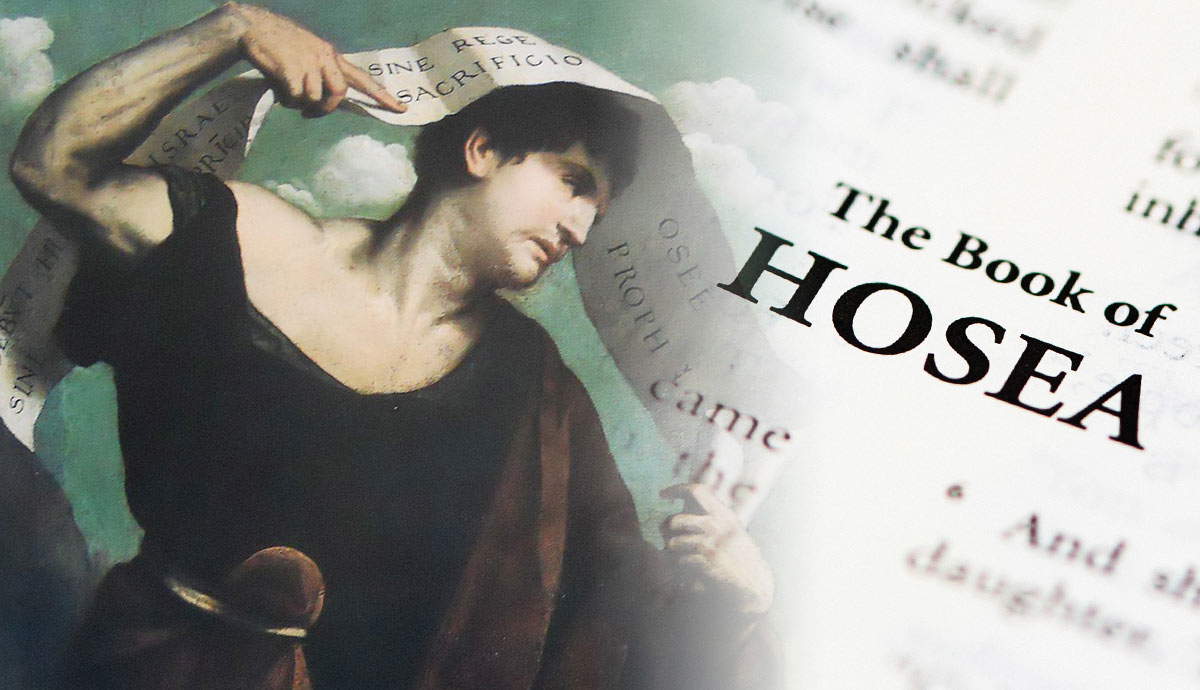
In the last and shortest of the Pauline Epistles in the Bible, Philemon addresses a wealthy slave owner and the people in his house church. It calls for his forgiveness for the misdeeds of a slave named Onesimus, who ran away and became a believer after visiting Paul in prison. Though short, this letter has an important message to convey.
Authorship and Date

Philemon is one of the authentic Pauline letters. It was sent from Paul and Timothy to Philemon during one of Paul’s many imprisonments between 60-64 CE, likely during 62 CE in Rome. In the greeting at the end of the letter, Paul sends salutations from a list of people who may have been visiting him in prison and knew Philemon.
Historical Context

Philemon was a rich man who became a believer during Paul’s ministry in Ephesus (52-55 CE). Back in Colossian society, he opened his house to believers as a place of worship. Philemon owned slaves, one of whom was called Onesimus.
Onesimus found himself at odds with his owner, Philemon, for an unspecified reason. He may have stolen money or property, though the text does not specify what his misdeed was. Whatever the motivation, Onesimus decided to run away and eventually ended up with Paul in prison in Rome. He may have simply been visiting Paul. Onesimus became a believer and showed himself to be useful to Paul in his ministry while they were together.
Slavery was widespread in the Roman Empire. As such, it was not unique to the New Testament context. The Israelites had also practiced slavery among themselves, where individuals and families could submit to indentured servitude to pay off debts they could not otherwise repay.
The letter to Philemon provides insight into how Christians dealt with the issue of slavery and what they considered appropriate behaviors by Christian slaves and slave owners. Paul’s letter shows he believed slaves and slave owners had the same status before God.

Paul makes it clear that he would prefer to have Onesimus staying with him and assisting him some more. He, however, recognizes Philemon’s authority over Onesimus and would not violate Philemon’s right to decide what Onesimus should do. Paul does not call for freedom for the slave. Rather, he calls for Philemon to consider Onesimus as more than just a mere slave and to consider sending him back as a co-worker for Paul.
The letter to Philemon is unique in the Pauline corpus because it is the only one that does not refer to Christ’s death and resurrection. This is likely because Philemon had already been a believer and leader in the church community for about a decade and was aware of the gospel message, therefore Paul had no reason to speak of it in his letter. However, Paul does call on Philemon to show the grace that accompanies the gospel message to Onesimus.
Structure

Philemon is a short letter that can nonetheless be divided into three parts.
Salutation (Philemon 1-7)
Paul greets Philemon and the other leaders of his house church with a typical Pauline greeting of grace and peace. He then gives thanks for Philemon’s love and faith.
Appeal (Philemon 8-20)
Paul appeals to Philemon to forgive Onesimus for his misdeeds and to accept him back into his service without retribution. He wants Philemon to consider his former slave as a brother and someone useful who can contribute to the service of Philemon and Paul.
Greeting (Philemon 21-25)
In Paul’s greeting to Philemon and his house church, he mentions five “fellow workers” who assisted him and also sent their greetings. Paul closes his letter with a blessing of grace.
The letter to Philemon shows a style reflective of Greek and Roman rhetoric. It starts by building a rapport and goodwill with the audience (verses 4-10) then presents the facts of the case to convince the intellect of the merits of the case (verses 11-19), and then appeals to the emotions of the audience (verses 20-21) for a positive outcome in line with the wishes of the author.
Main Themes

Reconciliation
The central message of Philemon is the call for reconciliation between Philemon and Onesimus. It is not apparent from the letter how Onesimus wronged Philemon, or what caused him to run away. What is evident is that Paul wants Philemon to look at Onesimus in a radically different way, though he still recognizes Philemon’s authority over Onesimus.
The Power of the Gospel
Paul describes Onesimus as useless to Philemon before, but now useful to both Philemon and Paul after becoming Paul’s son, which alludes to his conversion. The power of the gospel to bring such a change is significant because it is the basis for Paul calling on Philemon to consider Onesimus no longer a slave, but a brother (v 16), if not to himself, then to Paul. If the gospel had the same effect on Philemon as it had on Onesimus, then he would forgive the slave and consider him a brother in Christ.
Usefulness of Onesimus
Paul calls on Philemon to allow Onesimus to return to him and be an assistant in his ministry once everything has been settled between the slave and the slave owner. Paul wants Philemon to see Onesimus the way he does, as a “beloved brother.”
Key Passages

Philemon 1:6
“… and I pray that the sharing of your faith may become effective for the full knowledge of every good thing that is in us for the sake of Christ.”
An essential part of sharing the Christian faith is imparting the principle of unmerited forgiveness. Paul may be preparing Philemon for the appeal he would be making on behalf of Onesimus shortly. In a sense, he is saying that forgiving the slave and reconciling with him will exemplify the gospel message and will be a way of witnessing the faith Philemon proclaims.
Philemon 1:10-11
“I appeal to you for my child, Onesimus, whose father I became in my imprisonment. Formerly he was useless to you, but now he is indeed useful to you and to me.”
Claiming Onesimus as his child, Paul implies that the slave converted because of Paul’s ministry. Paul continues to stress the change that conversion brings about, stating that Onesimus is a valuable asset to Paul while he is ministering from prison.

Philemon 1:15-17
“For this perhaps is why he was parted from you for a while, that you might have him back forever, no longer as a bondservant but more than a bondservant, as a beloved brother — especially to me, but how much more to you, both in the flesh and in the Lord. So if you consider me your partner, receive him as you would receive me.”
Paul proposes that there may have been a reason that a period of separation between Philemon and Onesimus was necessary; to allow Philemon a new way of looking at the former slave. Paul calls on Philemon to consider Onesimus as a brother socially and spiritually.
Philemon 1:17-18
“So if you consider me your partner, receive him as you would receive me. If he has wronged you at all, or owes you anything, charge that to my account.”
Paul steps into the breach for Onesimus, stating that he would carry the burden for anything Onesimus may have taken from Philemon. He would later also remind Philemon that he was in Paul’s debt, signaling that the debts should be put behind them for the sake of reconciliation between Philemon and Onesimus.
Contemporary Relevance

Slavery is as common today as it was at any time in the past, though it is not as prevalent in Western society as it was in New Testament times. Though slavery is not practiced in the Christian context, the letter is nevertheless significant in the principles it conveys in terms of the status of believers before God and the relationship among believers with different social standings.
The essential principle the letter conveys is one of forgiveness and acceptance. It is as relevant today as it was in the time Paul had to write to Philemon on the issue. It serves as a lesson on how to treat one who has wronged you and how, before God, there is no distinction between slave owner and slave. Galatians 3:28 shares the same sentiment.
It is often perplexing to Christians today that the Bible does not speak out against slavery or ban the practice outright. However, the Bible also does not endorse the practice of mistreating others.
The letter to Philemon is an example of how law and grace work. Philemon had the legal right to punish Onesimus for his offenses of taking goods that did not belong to him and running away. Paul, however, calls on Philemon not to deal with the slave according to the law but to show him grace. Paul is willing to pay the debts on the slave’s behalf, just like Jesus paid for our sins. It serves as an object lesson on how to treat others we may have viewed as inferior to ourselves for whatever reason.










